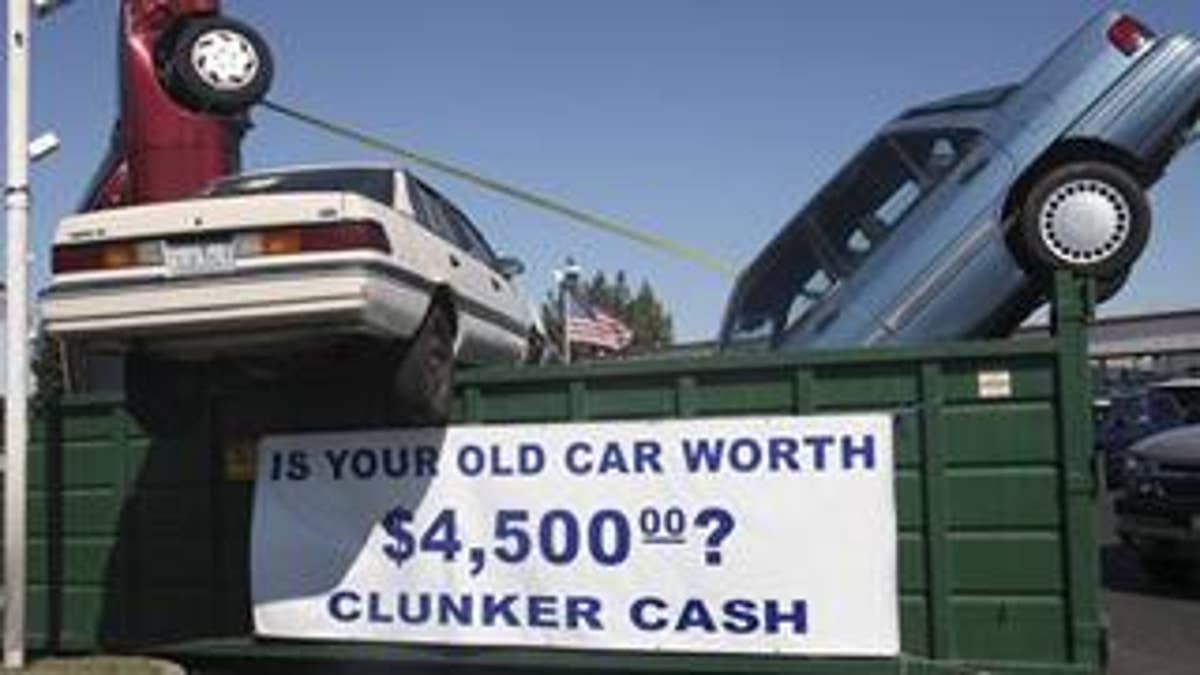
No one disputes the results of the "cash for clunkers" rebate program: It succeeded in blowing through nearly all its $1 billion in a week and can burn rubber at least through the weekend.
Congress is racing to infuse it with an additional $2 billion, but although supporters say the results prove the program has been an unqualified success, critics argue that it demonstrates the incompetence of the federal government.
The program was designed to encourage owners of pollution-spewing gas guzzlers to trade them in for new, more-efficient cars, helping the hard-pressed auto industry and the environment, too. Enticed by rebates of $3,500 to $4,500, car owners are jumping at the offer. It worked, almost too well.
Far more drivers signed up for the program, leaving dealers panicked over when or if the government would make good on the hefty rebates.
The House was first in what's expected to be a fast pit stop, voting to pour in another $2 billion. The Senate has yet to act -- it is expected to take up the measure next week -- but the White House said weekend deals would count, no matter what.
President Obama said the program has "succeeded well beyond our expectations" and is pushing the Senate to pass the measure next week.
But Republicans are questioning the government's readiness for wading deep into other private-sector strongholds, such as health care.
"If this is how the government is going to handle billion-dollar programs affecting all Americans, I ask, whatever will we do if this administration takes control of our health care?" Rep. Jerry Lewis, a California Republican, told the Wall Street Journal.
When asked how the administration and Congress could have underestimated the popularity of the program, White House spokesman Robert Gibbs skirted the question and simply said it's a sign of success that there is concern that too many people are buying cars.
"I think you've seen a combination of people understanding the incentives," he said, adding that he believes the success of the program benefits the economy and taxpayers "because the cars that they're purchasing have a higher average fuel mileage than the car they're trading in."
"That's good news down the road," he said. "We think the program has been a success."
But critics have a different view.
"This is not good for economic growth," said Dan Mitchell, a senior fellow in economics at the Cato Institute. "You're simply getting people to use existing income to spend on cars. Getting people to spend more of their money on cars mean they will have less money to spend on other things."
Economic growth, Mitchell argued, is not getting people to spend more money on products, it's getting them to have more income. Mitchell also believes the program is counterproductive for the auto industry down the road because the acceleration in car purchases will precede a "big downturn in the future."
"Giving someone a shot of heroin is not good for their long term health," he told FOXNews.com.
The program, Mitchell added, shows that the government is "incompetent."
But Bruce Belzowski, an auto industry expert at the University of Michigan, disagrees.
"It's hard to say they're incompetent when the program is creating jobs, stimulating the overall economy and reducing emissions. Where's the loss here?" he said. "You can say it's not administered as well. But this is like picking at gnats when you look at the big picture."
Belzowski told FOXNews.com the program was designed as part of the government's energy policy and the volume of trade-ins are resulting in more fuel-efficient vehicles on the road.
"I don't think it was meant to save the auto industry," he said, adding that automakers are not complaining. "I think it was more of a way to test the waters to say if we get into this business of providing some type of rebate, how would it work out. This is their first foray."




